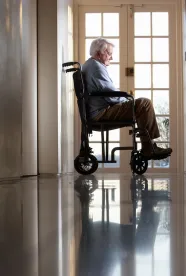Intervening When Residents with Dementia Engage in Sexual Activity
If Carrie Bradshaw finds herself in a nursing home one day, what obligations will the nursing home have to oversee her sex life? The federal court of appeals in Chicago addressed that question recently, holding that skilled nursing facilities have an obligation to intervene when residents with dementia or Alzheimer's disease engage in sexual activity.
In Neighbors Rehabilitation Center, LLC v. United States Department of Health and Human Services, three residents who suffered from dementia and/or Alzheimer's disease engaged in what the facility viewed as consensual sexual activities. One 80-year-old resident suffered from dementia but functioned at a relatively high level. His care plan required staff to assess whether his behavior endangered other residents and to intervene as necessary. Another 65-year-old male resident with Alzheimer's and dementia had significant cognitive impairments and had exhibited socially inappropriate behaviors, including asking staff to perform sex acts and inappropriately touching staff. The third resident, a 77-year-old female who suffered from Alzheimer's, had low cognitive functioning and severe hearing impairment.
At various times, the nursing facility staff found two of these residents engaged in sexual activities but failed to intervene because staff viewed the acts as consensual. A survey by the Illinois Department of Public Health, acting for itself and for the Centers for Medicare & Medicaid Services (CMS), cited the nursing facility with an immediate jeopardy violation for failing to adequately supervise the residents and a level J violation of the federal nursing home standards. The surveyors alleged that the nursing facility allowed residents to have consensual sexual interactions and that supervisors told staff they should not intervene or report sexual interactions unless a participant showed outward signs of non-consent.
The nursing facility argued that even residents with cognitive impairments have the right to engage in consensual intimate relationships and that staff monitored the relationships in question as necessary.
The CMS administrative law judge upheld the survey findings after a hearing. In response, the CMS Appeals Board and the nursing facility appealed those decisions to the federal court.
The federal appeals court began its analysis by noting that the facility did not dispute that the sexual interactions had occurred. Rather, the facility only disputed whether its handling of the interactions was inadequate or hazardous under the applicable regulations.
The facility alleged that it had sufficiently monitored the residents' interactions in a way that properly balanced the residents' need for privacy against their right to safety and that the staff knew to look for signs that any interaction was not consensual. The court noted, however, that when nursing home residents have cognitive or physical impairments, a facility must ensure that such intimate relationships are, in fact, consensual and that the nursing facility had failed to exercise that level of care.
The court also noted that the facility records showed no evidence that it had undertaken any investigation into whether the interactions at issue were consensual or whether the residents had the capacity to consent.
The federal appeals court, therefore, upheld the finding by the CMS Appeals Board. Because the facility failed to 1) talk to the residents about their feelings regarding these relationships, 2) document the residents' capacity for consent and 3) obtain medical assessments of how the residents' cognitive deficits affected their capacity to consent, the level J violation and the immediate jeopardy findings were correct.
Skilled nursing homes often have to balance residents' right to privacy against their ability to consent to sexual activity. As with many other concerns faced by nursing facilities, the failure to document residents' capacity to consent, consult with residents' physicians and discuss the issue with the residents themselves is a recipe for disaster.
Carrie's sex life will continue to be overanalyzed, even in her old age.




 />i
/>i

